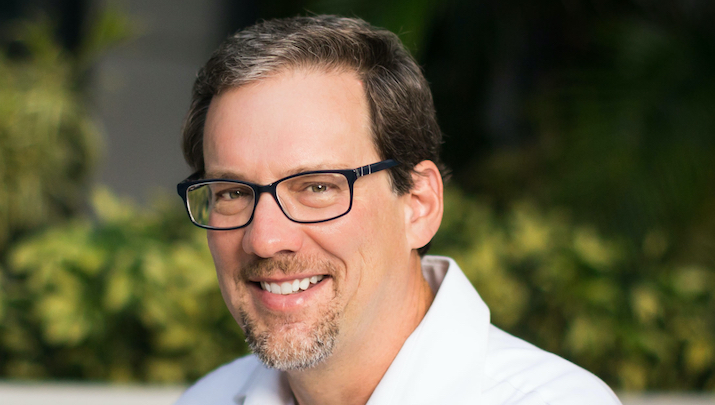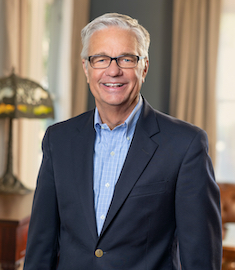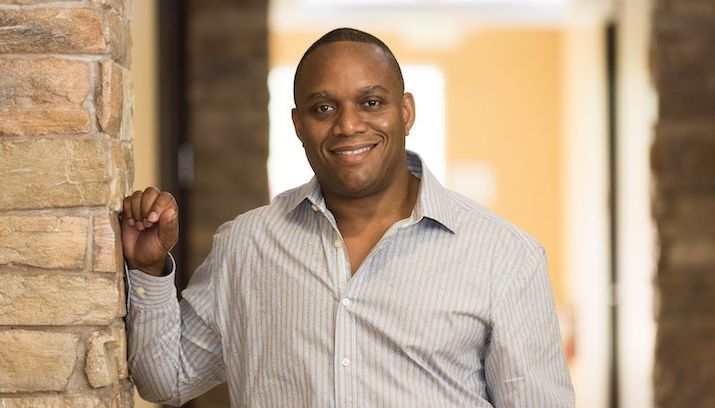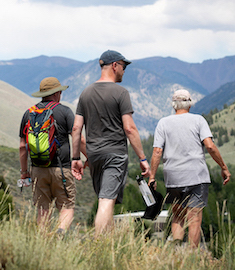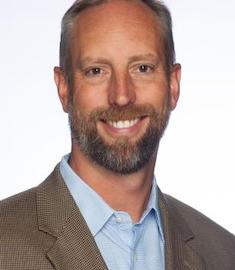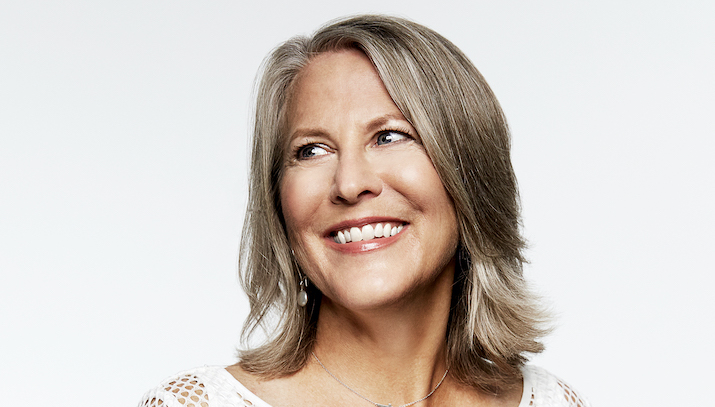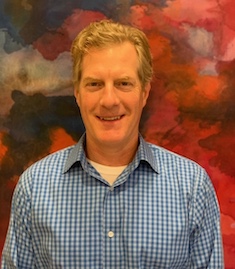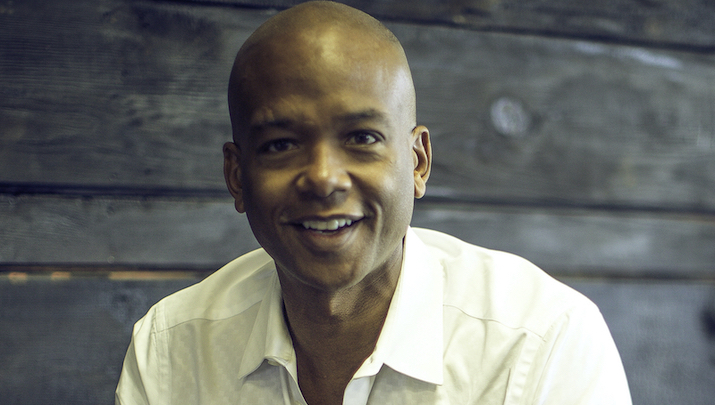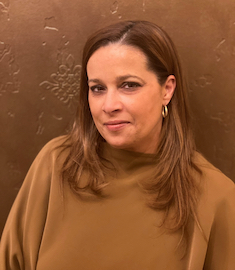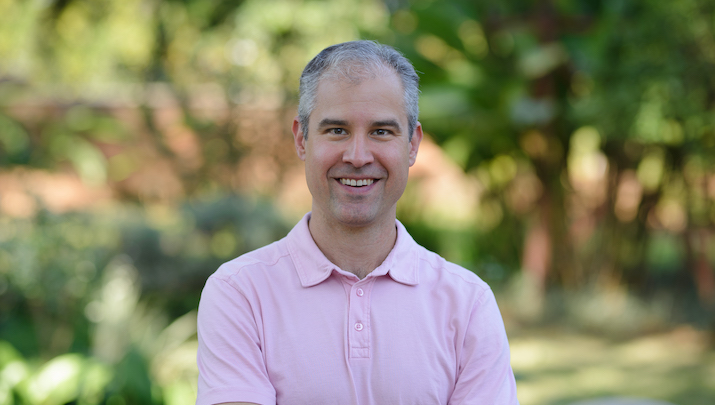Customer Service Excellence
Brad Cleveland has spent 30 years as a consultant in customer service, providing him unique perspective and expertise to offer insight into the issues facing Evergreen® leaders in this area today. In this talk from Tugboat Institute Gathering of Teams 2021, Brad describes both common missed opportunities and steps that leaders and teams can take to make a difference for their customers.
People of All Faiths Are at the Heart of What We Do
My mom and dad, Paul and Carol Kuck, founded our family company, Regal Marine Industries, in 1969. From the beginning, my dad used to say, “We’re in the people business, and we build great boats.”
We still believe that today. We strive to put People First, embracing policies that many Evergreen® businesses support—competitive pay and benefits, professional development and training opportunities, and an employee hardship fund, among them. Another powerful way we have found to support our team for over 20 years now is by providing workplace chaplains.
We know that our 750 team members come to work each day with a wide variety of goals, concerns, and challenges, and we want them to have a resource to address not only professional issues but to support their spiritual and emotional wellbeing. We want our team to know that we will walk with them when life is good and help them when they struggle—because we all do.
The chaplains we employ through Marketplace Chaplains, a third-party service, are integrated into the company as caregivers. We consider them part of the Regal family, and they support team members in a variety of ways. Throughout the work week, male and female chaplains spend time at the company, visiting and checking in with the team. Currently, we have six different chaplains who rotate through the company any given week and who, as a group, reflect the diversity of our team. They are charged with supporting team members of all faiths, without any agenda or bias.
The interaction between chaplains and team members is often very casual—they are connecting as caring friends, asking after people’s families, and building trusted relationships. As those relationships develop, the chaplains often have a deep knowledge of an employee’s family and personal life and are able to step in to provide comfort and counseling when a challenge arises and share in the joy of positive life events. Our chaplains have officiated at Regal employees’ weddings and funerals, provided marital counseling, and shared in many other milestone events among our team.
While some companies do employ full-time chaplains as members of their team, we appreciate the separation of working through a third-party provider because of the confidence it offers team members around confidentiality. We don’t receive any information about any interactions between the chaplains and team members, which we think allows for more authentic sharing around potentially sensitive topics. That’s the approach we have taken, but there are certainly a variety of ways to provide this benefit for your team.
After 20 years of offering Regal team members this resource, workplace chaplains remain a core pillar of our benefits. But the benefit is one tile of the larger mosaic of our People First picture. It’s one more way we can support the whole person as they come to work each day at our company, which is what this is really all about. We love to build boats, and it’s awesome that we get to do that, but at the end of the day, it’s people that are at the heart of what we do.
Duane Kuck is CEO of Regal Boats.
Empowering My Team through Challenging Times
Lester Thornhill, CEO of Life’s Abundance, approached the challenge of the COVID-19 pandemic with a commitment to continuous improvement. In this talk from Tugboat Institute Gathering of Teams 2021, Lester shares his story of opportunistic innovation through the pandemic, offering a compelling case for seizing upon moments of challenge to strengthen the team and the company for the long term.
Tugboat Institute Summit 2021: Connected and Curious
Every Tugboat Institute Summit is special. Its uniqueness reveals itself as two-and-a-half days of experiences unfold in the idyllic setting of Sun Valley, Idaho—a safe place to take off the armor, reflect, and be fully present. It was particularly meaningful to bring together Evergreen® leaders for this summit after a year of being apart.
As such, we were certain that the spirit of reconnection would be the unofficial theme of this ninth annual celebration. Tugboat Institute® members and event speakers were finally able to detach from Zoom screens and reacquaint themselves on a socially safe and human level. However, as we came together it was clear that the drive to gather was more than reconnection. It was a resurgence. A determined display of strength in numbers. Over 135 attendees, from 133 companies, in 27 industries, based in 33 states showed up and shared. The highest in-person summit attendance thus far.
The energy began to build with pre-program meetings. First Year Orientation provided 47 new members a warm introduction to the Tugboat Institute Summit experience thanks to the guidance of Tugboat Chairman, Jeff Snipes and Tugboat Institute’s Maria Hilton. Veteran attendees Elizabeth Glasbrenner, Mac Harman, Don MacAskill, and Lester Thornhill balanced the practical with the personal by sharing their insight and lessons learned. A workshop for large, multi-generational companies rounded out the half-day schedule and was led by Jennifer Pendergast, John L. Ward Clinical Professor of Family Enterprise and Executive Director of the John L. Ward Center for Family Enterprises at Kellogg School of Management, Northwestern University. The ideas formed during this meeting became part of the conversation for Jennifer’s presentation to all the attendees later in the week.
Mindfully curated TED-style talks comprised the next two days of programming—a mix of thought-provoking business ideas, post pandemic best practices, Evergreen principles in action, and personal journeys to inspire change beyond the boardroom.
Dave Whorton, CEO and Founder of Tugboat Institute, kicked off the experience with a brief history of venture capital, the development of the “Get Big Fast” playbook, and how Evergreen businesses prove there is an alternative path to growing leading and lasting companies. Gary Kunkle, PhD, Sr. Research Associate of University of Wisconsin, and David Eichhorn, President and Head of investments at NISA continued this thread by sharing insights around sustainable growth and how to manage the challenges that accompany a long horizon strategy. Jennifer Pendergast and Steve Shifman, CEO of Michelman, spoke to the crucial role of planning a healthy transition of leadership in family-owned businesses along with navigating the emotional element of this professional and personal process.
Best practices and innovative methods of building healthy and productive work environments while balancing business with creativity were topics addressed by Lisa Picard, CEO of EQ Office, and Leslie Jackson Chihuly, President and CEO of Chihuly Studio. Going back to the basics and the critical importance of instilling character in our youth and educational systems was the theme presented by David Holmes, Director of Character Collaborative. Steve Preston, CEO of Goodwill Industries International, asked attendees to reconsider their current hiring filter and apply a more enlightened approach to finding talent outside of the halls of academics.
People making an impact was at the center of the following talks. Dave Petersen, President and CEO of O.C. Tanner Company, and Susie Quesada, President of Ramar Foods International, focused on the abundance of professional satisfaction and innovation that comes from a People First workplace. Evergreen business leaders Tom Rosztoczy, Michael Spraggins, and Lester Thornhill presented tangible ways to create real change in your own community and beyond. Melvin Gravely, CEO of TriVersity Construction, and Conni Reed, Founder and CEO of Consuela, vulnerably shared deeply personal stories that profoundly shifted the thinking and perspective of the audience.
Following the talks, the attendees were given the opportunity to reflect and further discuss during afternoon adventures and evening celebrations at iconic Sun Valley locations. Whether on a bicycle, the golf course, or around an intimate conversation at dinner, attendees noted the depth and ease of connection with their peers despite the year gap at in-person events.
There is no doubt that the commitment to the Evergreen movement remains strong despite a global pandemic—an intact community of purpose-driven leaders united by the Evergreen 7Ps® principles and the common ground on which they build companies that last and make a difference. We look forward to continuing the conversations in our upcoming Tugboat Seminars, Tugboat Institute Fall Exemplar visit to Edward Jones, and again at Tugboat Institute Summit 2022.
Until then…be curious.
Susanne Lally is Director of Marketing, Trademarks, and Partnerships at Tugboat Institute.
A Century-Old Family Business Comes of Age
In 1993, when I joined our Evergreen® family business, Haws, the company was being operated by two grandsons of the founder—my father-in-law and one of his cousins. The company, which manufactures hydration and emergency response equipment, was founded in 1906, and the cousins represented third generation family leadership in the business.
When I stepped in, there was an unspoken understanding that the two cousins ran the business, and no other family members really asked questions. My wife has no recollection of any conversations around the business while she was growing up; family shareholder involvement was really non-existent.
Having spent my early career in the military—I had attended the Naval Academy and was still serving as an officer when my father-in-law approached me about joining the company—I entered into that landscape without expectations or awareness of best practices around governance. I didn’t have a roadmap.
In 2005, the potential for significant damage to the company in the absence of clear governance was highlighted when our family went through a challenging internal conflict that revealed the lack of hygiene in this area. As difficult as that period was, the outcome was positive: A commitment, as family stewards of our business, to do the governance work necessary to protect the business. Our efforts since that time have been transformative, and, we believe, will help ensure the long-term sustainability of our private, family ownership.
In reflecting on the key learnings of our family’s experience, there are steps we have taken and practices we have implemented that have been essential in creating the roadmap we now have to help grow the company for another 100 years:
Professional Facilitation for Effective Communication
It’s no secret that families don't always do a great job communicating in general, even in the best of circumstances. In a family business, wherein family members are also shareholders, the situation can be ripe for miscommunication and heightened emotions.
We found that inviting a family facilitator to help us was incredibly helpful. This professional created a safe space in which we could have productive conversations that focused on the issues of the business, not personal history, and led to productive conclusions.
In seeking this help, we were lucky to find a professional who was a great fit for our family in tone, style, and expertise. This allowed our shareholders—who at the time ranged in age from 35 to 80—to feel comfortable in what is a potentially vulnerable situation and contribute to the conversation.
Family Council
The precedent of non-communication among family shareholders was initially a cultural barrier, harder to overcome than we had anticipated. But the formation of the family council and a regular cadence of family meetings allowed us to move forward. Very quickly, when we brought in our outside facilitators at our first meeting, everybody saw the walls come crumbling down. The collective reaction was, “Wow, this is actually really good work. I'm glad we're doing it.”
The family council, which included G3 through G4 shareholders, became the vehicle that we used to discuss and implement governance. Two first critical steps in this process were the drafting of our family creed and guiding principles, which took several months for twelve members to agree upon. This was later followed by the crafting of a buy-sell agreement, which would come to serve us later.
Values and Guiding Principles
The development of our guiding principles through the family council forced us to ask, as a family, “What is important to us? What are our values?”
In our case, those conversations transformed our company in a way we didn’t expect. It became very clear as we discussed the business as an extended family, that in spite of the fact that my father-in-law and his cousin ran the business together for decades, they had very different values.
The two families were not aligned around the purpose of the business. Our side of the family was interested in investing in the business on a very long-term horizon; the other side was interested in extracting money out of the business and using it to support their lifestyle. We weren’t on the same page.
Our disparate views could have meant the end to our family business had we not engaged the family facilitator to help us through these challenging conversations. Through facilitation, we were able to avoid personal conflict and focus on the issues. One thing we agreed upon was increasing family accountability in the business, which resulted in a decision to establish a board that would include independent directors.
Board of Directors
As family owners working in the business, we wanted to be held accountable to what the larger group of family shareholders wanted us to deliver. If any one of us who held operating roles was not the best-qualified person for that position, we wanted that feedback from an objective board. And we got it. It was this board that within a year had decided that the family member running the business should be replaced. By now, G4 was running the business, and that decision ultimately led to my wife and her sister buying out their cousins for full control of the enterprise. In our case, we had to break the family apart to make the business stronger for the long term. We simply could not share business ownership and not share the same values.
Growing Together Today for a Healthy Future
We know that our work around governance is not over. In fact, it’s an ongoing practice. While we’ve established helpful foundational processes and guidelines, those are really just scaffolding for the many actions and decisions we make daily as a family in the business and as shareholders. We are continually reiterating our values, especially to the G5 shareholders, to ensure we remain aligned: “This is who we are. This is how we behave.” And, because we now have guidelines and established practices as family shareholders, if anyone has a question or says, “Hey, there's a better way to do this,” we can get together and have a productive conversation.
Finally, the time and effort we have expended and continue to devote to this work has another, incredibly fulfilling upside: It brings us closer as a family. Serving the business together, sharing that responsibility and continually articulating what that means, connects us to one another and the long-term success of the gift we share.
Tom White is Chairman and CEO of Haws Corporation.
Learning to Be a Manager
Prioritizing leadership development, and specifically training new managers, is essential for leaders who are building companies aligned with the Evergreen 7Ps® principles. In this talk from Tugboat Institute Gathering of Teams 2021, Carrie Freeman Parsons, Chairman of global event management company Freeman, shares key lessons she has learned around professional development, purpose, and hiring in her leadership journey. Ultimately, Carrie observes, leaders recognize that learning never stops, and each leader must continue to develop to honor the responsibility of leading the team and the company.
A Wall Street 'Numbers Guy' Learns a Better Way: Build an Evergreen Company
I founded our Evergreen® laundromat business, SuperSuds, in 1996. Having come from a career on Wall Street, I launched the company as a numbers guy. I saw opportunity in a $6 billion fragmented industry, consisting mostly of mom-and-pop stores, to grow a regional business through paced acquisitions over time. The metrics were all promising for developing professionally run stores, and I jumped in.
I quickly realized what I had known theoretically in my finance career—there’s a big difference between being an investor and being an operator. I had never managed people, and I was learning as I went.
Fast forward ten years, and I was loving the entrepreneurial journey and the fulfillment of owning and operating the business. I recognized what a great opportunity our SuperSuds model represented if we continued to grow. But I also realized that to grow as I envisioned, I needed to focus on operational excellence—to really dig in and create processes to move us forward. It was at that point that I re-read Jack Stack’s The Great Game of Business (GGOB). It was an eye-opening re-introduction to the principles of open book management.
The implementation of GGOB in 2016 transformed SuperSuds into an open-book, values-driven organization and has propelled us to disrupt our industry. Values-based customer service carried out by team members via intentional, right actions stemming from a shared vision has become our secret sauce.
Our vision is to create an environment where our customers actually look forward to doing their laundry. We do that through our unique customer service experience, which makes a lasting and positive impact on our employees, our customers, and the communities we serve every day.
We have developed our approach to customer service over the years through key learnings from leaders across other industries who have cracked the code—think Ritz-Carlton and Chick-fil-A—but also from ideas generated from our own team. Together, these practices and holistic orientation toward serving or customers drive us toward our vision.
And while we’re incredibly proud to tout that vision on our website, we understand that achieving that goal is only possible when our team lives it every day through consistent actions aligned with our values. We call these right actions “The SuperSuds Way”—specific steps that are each tied to one of our six core values and which, together, create a better customer experience. Because at the end of the day, if our customers aren't getting a good experience, they're not going to come back. Any one of our approximately 20,000 competitors can put in new equipment; what truly moves the needle forward, and creates a lasting competitive advantage, is the way our team engages with our customers.
For instance, one of our six core values is “Go Above and Beyond to Create a Community of Loyal Customers.” The action, or “SuperSuds Way,” connected to this value is an approach we call LAST: Listen to the problem with empathy; Apologize with sincerity; Solve the problem; and Thank the customer for his or her business. Importantly, employees have monetary discretion to solve the problem, when required; they don't have to call a manager or promise to send a refund check. The customer receives a refund, sees their problem solved, and is thanked for their business. The team member is empowered by taking an action aligned with our values and helps us achieve our vision by adding one more satisfied customer to our loyal community.
Through this and other actions within the SuperSuds Way, we have created a road map of specific steps team members can follow. Rather than encouraging employees to abide by a generic value, which might be subject to interpretation from person to person, we are offering a clear, direct action to take today to help the team achieve success. Right actions repeated over time result in behavioral change in employees and across the organization, as these steps become second nature.
To ensure team members continue to take right actions, we’ve implemented systems to recognize and reward employees who are living our values. When a team member takes an action that leads to great customer experience, they get positive feedback, which then reinforces future actions. How do we learn about those actions? We gather feedback from customers through surveys, online reviews, questionnaire cards at our stores, website comments, and an 800-number. We also solicit direct feedback from other employees who notice when a colleague has done something to highlight.
Every week, we gather our key 60-plus employees for a virtual Huddle, during which we share financials and provide team members the opportunity to offer “shout-outs” to their colleagues. If an employee gets a shout out, he or she can spin a wheel right there for a prize. Anyone who gets a shout-out is also entered into a drawing at our monthly meeting, when we report our numbers and do a big spin for a much heftier prize.
In addition to these opportunities for peer- and customer-feedback, I personally send out value cards every week to recognize employees who are going above and beyond through actions they are taking.
While I appreciate the opportunity to recognize team members, I believe that long-term success in achieving our vision is the result of bottom-up support. We created these values as a team, and we will only thrive if every member of the team takes daily actions that reflect our shared commitment. I can’t dictate adherence to values. As Jack Stack says, “people support what they help create.”
As we continue to build the business together, our team takes pride in the financial impact of our shared vision. In a flat-line industry that does not show much growth over time, sales in our original stores have increased about 20 percent in the four years since we implemented GGOB, and our EBITDA is up 50 percent. I believe these results reflect all of the daily actions we take, the financial transparency we share, and the vision we strive toward to create a unique experience for our customers. I can’t wait to see where we go from here.
Bob Schwartz is Managing Member and President of SuperSuds.
Move to the Edge, Declare it Center
In times of rapid change and chaos, there’s often no playbook for leaders faced with solving complex problems. In this talk from Tugboat Institute® Gathering of Teams 2021, Everett Harper, CEO of software development company Truss, offers insight into a framework he developed to create a pathway for decision making and engineer structure amidst uncertainty.
More Than 80 Years Later, A Company Finds Its 'Why'
Our broadline food distribution company, Nicholas and Company is a third-generation family-owned and operated business headquartered in Salt Lake City, Utah. Founded by my husband’s grandfather, Nicholas Mouskondis, in 1939, the story of our company in many ways reflects a classic immigrant success story. Nicholas came to the U.S. from Crete, Greece with nothing but the clothes on his back. He didn’t speak a word of English. Today, the company he founded is the single largest independent food distribution service in the Intermountain West.
We’re incredibly proud of our founding story and of our current success. But about eight years ago, we were prompted to re-evaluate our mission statement, and we realized that the mission we were sharing, the words we were using to tell our story publicly, no longer reflected who we were.
The catalyst for our revision of the mission was a conversation with a woman we had come to know well as a representative of Best Companies to Work For. We had been honored by the organization repeatedly, and the same representative from the organization would visit us year-after-year to interview our employees and validate survey responses. After about 10 years of these annual visits, she pulled me aside and said, "Look, I've been watching your company grow. I've been personally interviewing you and your employees for the last decade. I've watched the way that you operate. And I just might offer a suggestion: You don't market yourself well. Your mission statement doesn’t say anything about who you are and what you do.”
At the time, our mission, created by my father-in-law, was the acronym P-R-I-D-E: Providing Responsive Innovative Distribution Excellence. “Yeah, it has a nice ring,” she said, “and it’s easy to remember, but it doesn't say who you are. Any distribution company in the world distributing any kind of product could have the same mission. You’re missing the boat because you're pretty special."
At the time, though my father-in-law was no longer running the business, he was still very involved as Chairman of the Board. As I absorbed the feedback, my first thought was, “I'm not touching this with a 10-foot pole. My father-in-law created the mission. It’s his baby; changing it would be sacrilege.”
But the conversation kept gnawing at me. I started researching established, long-lived successful companies, and I found many examples of mission statements that had been revised over the years. When you look at companies that have longevity, a significant factor in their enduring success is their ability to evolve and innovate to continue to grow. In many cases, it’s just good business to revise a mission to accurately reflect the change.
In the case of Nicholas ad Company, I realized, "We're no longer the little family company underneath the viaduct just scraping by. We're a force to be reckoned with, and we need to tell the world that. We need to be proud of that.”
Armed with my research, I took a deep breath and approached my father-in-law. I told him that I didn't want to do anything to disrespect him or his previous work, but that, due to the efforts of now three generations, the business had expanded and evolved, and our mission should reflect that. To my relief, he was incredibly excited. He understood the success that this step signified. By revising the mission, we were putting a stake in the ground to say, "We want this company to go forward. We want to continue to innovate. We are thinking about this long-term."
With my father-in-law’s blessing, we launched an initiative to develop a new, purpose-driven mission statement. We wanted to uncover our “why” and to share it with the world. We sought feedback from stakeholders—team members, customers, suppliers, and community members. We asked: "Tell us what sets us apart. What is it you feel when you do business with or interact with our company?”
We hung huge, five-foot sticky notes all over the break room and common areas in the company, and we asked people to jot down words that they felt described who we are. We asked for input from spouses and kids—we went wide and deep. And what we got, repeatedly, were words like “safety,” “security,” “family,” “caring,” “integrity,” and “honesty.” And what we felt behind those words from our team was a tremendous pride in the organization.
From our customers, we heard many of the same words, and other positive feedback, but often when we asked the question, there would be a pause, and the customer would say something along the lines of, “It’s just different doing business with you. I can’t describe it—it just feels right.”
Over the course of about a year, my husband, Peter, and I, who are co-CEOs, would come home at night and talk about the responses we had received. We were trying to find the through line in what we were hearing and reading, to create a coherent statement that would reflect the words but also the feeling that people told us they experienced when they engaged with our company. It was like trying to name a baby.
Ironically, what we kept coming back to in trying to create a shiny, new statement, was ancient history—a Greek word that took us right back to our founding story. Philotimo, loosely translated to English, basically means “the love of honor”—a sense of nobility and joyful hospitality; the obligation to make things better and to right the wrongs. It’s really an all-encompassing feeling, a way of being.
Peter and I realized that philotimo was the one word that really tells our story. It’s who we are and it's what makes us different—it’s our unique DNA. It captures the “it” that so many people told us was our differentiator but that they couldn’t articulate. With that as our inspiration, we drafted a mission: “Preserving our family recipe for success by securing the dreams of all future generations.” We say that philotimo is the secret ingredient in our recipe. The mission honors our heritage—the family and our story—and it articulates our purpose to steward the company so that we can help others fulfill their dreams, just as Nicholas saw his come true.
Today, our mission statement allows us to articulate who we are as a company, not just what we do. It communicates our “why.” And, it helps us share our Purpose with a new generation of prospective employees who are increasingly seeking out purpose-driven work. As a leader in the company, launching the initiative and seeing it through to the end reaffirmed my personal “why” and gave me a lot of confidence in our ability to continue to move the company forward for generations to come.
Nicole Mouskondis is Co-CEO of Nicholas and Company.
Innovative Theory: A Framework for Executing Innovation
Michael Horn, co-founder of the Clayton Christensen Institute for Disruptive Innovation, shares a provocative concept in this talk from Tugboat Institute Gathering of Teams 2021. Silicon Valley is widely believed to be the source of disruptive, market creating innovation. Michael deconstructs this myth and argues that Evergreen® companies – operating under long planning horizons and a focus on profitable growth – are actually poised to be the engine for future market creating disruptive innovations. Michael’s presentation provides a compelling case of how Evergreen businesses are best positioned to spark new industries and job growth again and again.
